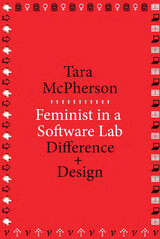
For over a dozen years, the Vectors Lab has experimented with digital scholarship through its online publication, Vectors, and through Scalar, a multimedia authoring platform. The history of this software lab intersects a much longer tale about computation in the humanities, as well as tensions about the role of theory in related projects.
Tara McPherson considers debates around the role of cultural theory within the digital humanities and addresses Gary Hall’s claim that the goals of critical theory and of quantitative or computational analysis may be irreconcilable (or at the very least require “far more time and care”). She then asks what it might mean to design—from conception—digital tools and applications that emerge from contextual concerns of cultural theory and, in particular, from a feminist concern for difference. This path leads back to the Vectors Lab and its ongoing efforts at the intersection of theory and praxis.

Computer technology is pervasive in the modern world, its role ever more important as it becomes embedded in a myriad of physical systems and disciplinary ways of thinking. The late Michael Sean Mahoney was a pioneer scholar of the history of computing, one of the first established historians of science to take seriously the challenges and opportunities posed by information technology to our understanding of the twentieth century.
Mahoney’s work ranged widely, from logic and the theory of computation to the development of software and applications as craft-work. But it was always informed by a unique perspective derived from his distinguished work on the history of medieval mathematics and experimental practice during the Scientific Revolution. His writings offered a new angle on very recent events and ideas and bridged the gaps between academic historians and computer scientists. Indeed, he came to believe that the field was irreducibly pluralistic and that there could be only histories of computing.
In this collection, Thomas Haigh presents thirteen of Mahoney’s essays and papers organized across three categories: historiography, software engineering, and theoretical computer science. His introduction surveys Mahoney’s work to trace the development of key themes, illuminate connections among different areas of his research, and put his contributions into context. The volume also includes an essay on Mahoney by his former students Jed Z. Buchwald and D. Graham Burnett. The result is a landmark work, of interest to computer professionals as well as historians of technology and science.

Building on current scholarly work in digital rhetoric, software studies, and technical communication, Brock connects and continues ongoing conversations among rhetoricians, technical communicators, software studies scholars, and programming practitioners to demonstrate how software code and its surrounding discourse are highly rhetorical forms of communication. He considers examples ranging from large, well-known projects like Mozilla Firefox to small-scale programs like the “FizzBuzz” test common in many programming job interviews. Undertaking specific examinations of code texts as well as the contexts surrounding their composition, Brock illuminates the variety and depth of rhetorical activity taking place in and around code, from individual differences in style to changes in large-scale organizational and community norms.
Rhetorical Code Studies holds significant implications for digital communication, multimodal composition, and the cultural analysis of software and its creation. It will interest academics and students of writing, rhetoric, and software engineering as well as technical communicators and developers of all types of software.
READERS
Browse our collection.
PUBLISHERS
See BiblioVault's publisher services.
STUDENT SERVICES
Files for college accessibility offices.
UChicago Accessibility Resources
home | accessibility | search | about | contact us
BiblioVault ® 2001 - 2024
The University of Chicago Press









